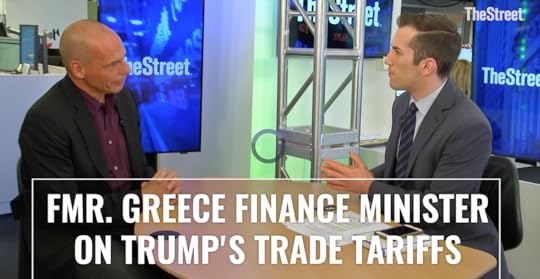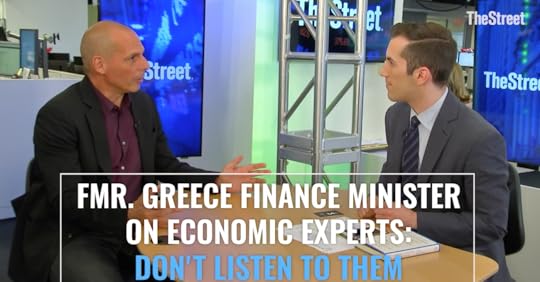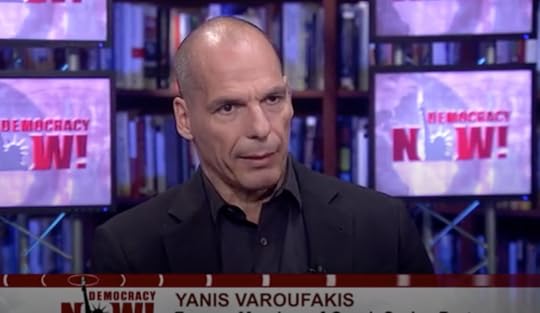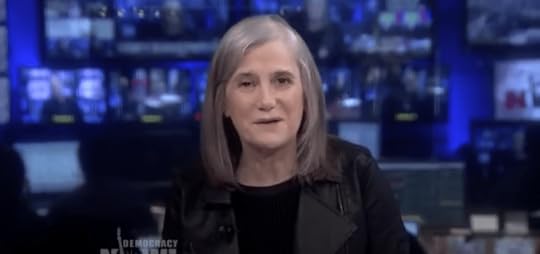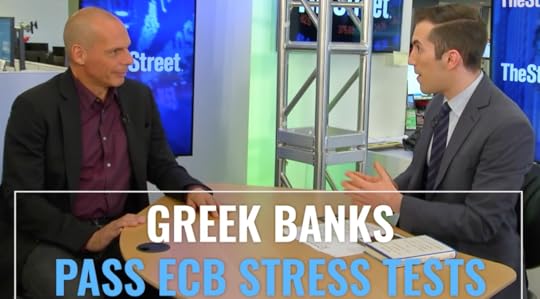Yanis Varoufakis's Blog, page 103
May 19, 2018
On Trump’s tariffs and why we should never trust ‘economic experts’ – interviewed by Scott Gamm for TheStreet
Click photo above or here for the video discussing Trump’s trade tariff strategy
Click photo above or here for the video regarding the so-called ‘economic experts’
May 18, 2018
On Iran Nuclear Deal Demise, US Trade Negotiations, Europe’s Far Right & Capitalism – TV interview with Amy Goodman on Democracy Now!
Click the photo above or here for Part 1: Yanis Varoufakis on Lost U.S. Credibility in Middle East, from Iran Deal to Israel Embassy Move
Part 2: Yanis Varoufakis on Iran Nuclear Deal Demise, US Trade Negotiations, Europe’s Far Right & Capitalism
In the latest economic fallout from President Trump’s decision to pull the United States out of the landmark Iran nuclear agreement, top White House officials said Sunday that the Trump administration is prepared to impose sanctions on European companies that do business with Iran. We get response from former Greek Finance Minister Yanis Varoufakis, who was the chief negotiator of Greece’s bailout with the European Union and International Monetary Fund. He also discusses the opening of the U.S. Embassy in Jerusalem and calls it a “civil rights catastrophe.” His new book is titled “Talking to My Daughter About the Economy: Or, How Capitalism Works—And How It Fails.” Varoufakis served as finance minister in Greece in 2015, before resigning from the Syriza government. He is also co-founder of Democracy in Europe Movement 2025, known as DiEM25.
For the Democracy Now site, click here.
May 17, 2018
Discussing capitalism with Alex Cohen, at the Los Angeles Public Reference Library – video
Want to know why the recent ECB stress tests of the Greek banks had to be fraudulent? – Video interview on TheStreet
May 15, 2018
Discussing Seattle’s Amazon Head Tax on NPR’s (KUOW NPR 94.9) ‘On The Record’ – 15 MAY 2018
«Εθελοτυφλούν όσοι βλέπουν καθαρή έξοδο από το Μνημόνιο» – Συνέντευξη, ΤΑ ΝΕΑ, 28 ΑΠΡ 2018
Πόσο κόστισε η διαπραγμάτευση του 2015;
Φανταστείτε να ετίθετο το ερώτημα «Πόσο κόστισε το ΟΧΙ της 28ης Οκτωβρίου στον Ελληνισμό;», με κάποιους να ωρύονται ότι εκείνο το ΟΧΙ ευθύνεται για τα δεινά της Κατοχής που ακολούθησε. Η απάντηση βέβαια είναι ότι δεν κόστισε το ΟΧΙ αλλά το τελεσίγραφο των κατακτητών και η Κατοχή που ήρθε μετά την κατάρρευση του μετώπου του ΟΧΙ. Ετσι και με την άνοιξη του 2015: Ο ελληνισμός πλήρωσε ακριβά τα συνεχή ΝΑΙ στην τρόικα εκείνων που σήμερα ανερυθρίαστα μιλούν για «κόστος Βαρουφάκη», για την ακρίβεια με την συρρίκνωση του ΑΕΠ από τα 238 δισ. ευρώ το 2009 στα 178 δισ. το 2014. Και σήμερα πληρώνει την μετατροπή του ΟΧΙ της 5ης Ιουλίου 2015 σε άλλο ένα ΝΑΙ στη χρεοδουλοπαροικία. Πόσο λοιπόν κόστισε η διαπραγμάτευση; Μηδέν! Το εθνικό εισόδημα το άφησα την ημέρα της παραίτησής μου λίγο-πολύ στο ίδιο επίπεδο με εκείνο του Ιανουαρίου 2015. Ακόμα και σήμερα, μετά τα αποτελέσματα της συνθηκολόγησης, το ΑΕΟ βρίσκεται λίγο πολύ στα επίπεδα του Ιανουαρίου 2015. Κατά την υπουργία μου δεν εισάχθηκε ούτε ένα ευρώ νέων φόρων, περικοπών σε συντάξεις ή μισθούς ή επιδόματα. Ούτε ένα ευρώ νέου δημόσιου χρέους, καθώς κατά τη διαπραγμάτευση το κράτος κάλυπτε πλήρως τις δαπάνες του αποπληρώνοντας από το υστέρημά του τοκοχρεολύσια. Οσο για τα ταμειακά του κράτους, τον Ιούλιο του 2015 ήταν λίγο καλύτερα σε σχέση με τα απολύτως άδεια ταμεία που παρέλαβα. Το τι συνέβη με τη διαπραγμάτευση του 2015 το περιέγραψε πρόσφατα ο Jeff Sachs, καθηγητής στο Columbia, με σχόλιο-απάντησή του στους ισχυρισμούς Βίζερ περί 200 δισ. ευρώ «κόστους Βαρουφάκη»: «Οπως γνωρίζει ο κ. Βίζερ – καθώς ήταν από τους αρχιτέκτονες των πολιτικών της τρόικας – η ελληνική οικονομία στραγγαλίστηκε το 2015 από τους δανειστές. Οι δανειστές κατέφεραν σοβαρή ζημιά από την πρώτη μέρα: υπονόμευσαν τη ρευστότητα του τραπεζικού συστήματος, αρνήθηκαν την αναδιάρθρωση του χρέους, επέμεναν σε σκληρή λιτότητα και, το πιο σημαντικό, αρνήθηκαν κάθετα να διαπραγματευτούν ή ακόμα και να συζητήσουν καλή τη πίστει.» Το πραγματικό κόστος ήταν εκείνο που επέφερε η τρόικα κλείνοντας τη στρόφιγγα της ρευστότητας στις ελληνικές τράπεζες με σκοπό την επιβολή capital controls, που στόχο είχαν να πάψει η οποιαδήποτε συζήτηση για την αναδιάρθρωση χρέους
n που ήταν προαπαιτούμενο για στόχο πρωτογενούς πλεονάσματος 1% με 1,5%
n που ήταν προαπαιτούμενο για την μείωση των φορολογικών συντελεστών
nπου επέμενα ότι ήταν αναγκαία συνθήκη για την ανάκαμψη.
Δεν είναι ενδιαφέρον ότι όλοι εκείνοι οι «βάστα Γερούν», που τότε συντάσσονταν με την τρόικα που έκλεισε τις ελληνικές τράπεζες ώστε να αυξηθούν οι φορολογικοί συντελεστές, σήμερα βαφτίζουν το κόστος της τρόικας «κόστος Βαρουφάκη» και, παράλληλα, απαιτούν τη μείωση των… φορολογικών συντελεστών;
Η χώρα βγαίνει απο το Μνημόνιο;
Κάθε Μνημόνιο που επιβάλλεται σε χρεοκοπημένη χώρα αποτελείται από τρία μέρη: (Α) Νέα δάνεια, (Β) Νέα μέτρα, (Γ) Αποπληρωμές δανείων. Αυτό που τελειώνει το καλοκαίρι είναι το (Α): τα νέα, άμεσα δάνεια από το 3ο μνημονιακό δάνειο, με την κυβέρνηση να έχει ξοδέψει 54 δισ. και να κρατά ως μαξιλάρι 32 δισ. Από αυτά τα 32 δισ. το Δημόσιο θα πρέπει να αποπληρώσει: 98 δισ. την περίοδο 2018-2030 κι άλλα 174 από το 2030 έως το 2060 – ποσά που πρέπει να βγουν από τη σάρκα και το αίμα του ελληνικού λαού. Παράλληλα, η κυβέρνηση έχει δεσμευτεί σε νέα, πάνσκληρα μέτρα λιτότητας από τον επόμενο Ιανουάριο, ενώ οι ευκολίες πληρωμών που συζητιούνται για το χρέος, πρώτον, θα επιβαρύνουν το χρέος μακροπρόθεσμα και, δεύτερον, θα δοθούν υπό νέους όρους λιτότητας στο διηνεκές. Αν κάποιος εθελοτυφλεί τόσο πολύ που τα πιο πάνω να τα χαρακτηρίζει «τέλος του Μνημονίου», «καθαρή έξοδο» κ.λπ., αξίζει τη συμπάθειά μας.
Τι πήγε λάθος στην πρώτη διακυβέρνηση;
Οτι υποχωρήσαμε από μια θέση στην οποία δηλώναμε ανυποχώρητοι: Δεν υπογράφουμε συμφωνία που επιτρέπει στην τρόικα να πληρώνει τον εαυτό της υπό όρους που μονιμοποιούν τη χρεοδουλοπαροικία.
Το κίνημά σας τι θα έκανε;
Το ΜέΡΑ25 ιδρύθηκε για να επαναφέρει αυτή την κοινή λογική στο πολιτικό σκηνικό. Μετριοπαθείς, λογικές τομές που καθιστούν τη χώρα βιώσιμη, τις οποίες θα κάνουμε ακόμα κι αν το αντίτιμο είναι η εκδίωξή μας από το ευρώ.
Μήπως δρομολογείτε έναν νέο ΣΥΡΙΖΑ;
Δεν ήμουν ποτέ μέλος του ΣΥΡΙΖΑ. Οι ίδιοι λόγοι που με απέτρεπαν να γίνω μέλος τότε εγγυώνται ότι δεν με ενδιαφέρει η… επανίδρυσή του σήμερα – πόσω μάλλον η συνεργασία με τη σημερινή του έκφανση.
Κι αν η ΕΕ έχει μια άκαμπτη αρχιτεκτονική και ο δρόμος που προτείνετε είναι ανέφικτος;
Οι επτά τομές που το ΜέΡΑ25 δεσμεύεται να νομοθετήσει είναι αναγκαίες για την ανάκαμψη της χώρας είτε εντός είτε εκτός ευρώ. Για αυτό δεσμευόμαστε να τα νομοθετήσουμε άνευ διαπραγμάτευσης. Αρα, είναι απολύτως εφικτές. Το εάν και πόσο η ΕΕ είναι τόσο άκαμπτη όσο λέτε, αυτό θα φανεί από την αντίδραση του βαθέος κατεστημένου της. Θα μας εκδιώξουν από το ευρώ ως αντίποινα για τις αναγκαίες τομές που θα εισάγουμε; Πιστεύω πως όχι. Αλλά ακόμα κι αν προχωρήσουν στο Grexit, με την νομοθέτηση των επτά τομών που εισηγούμαστε η Ελλάδα, μεσο-μακροπρόθεσμα, θα ανακάμψει ουσιαστικά.
Θα τα βρίσκατε με τον Αλέξη Τσίπρα; Υπάρχουν βουλευτές του ΣΥΡΙΖΑ που σας καταλογίζουν πως κοστίσατε πολύ.
Δεν θα αρνηθώ σε κανένα στέλεχος του σημερινού ΣΥΡΙΖΑ το δικαίωμα να υπονομεύει τον Πρωθυπουργό του μέσα από τέτοιες δηλώσεις – δεδομένου ότι καθετί που έκανα ήταν σε πλήρη αρμονία με τον κ. Τσίπρα. Είναι εσωτερικό τους ζήτημα. Οσον αφορά τις συνεργασίες, το ΜέΡΑ25 δεν θα συνεργαστεί σε παλαιοκομματική βάση επιλέγοντας άτομα και κόμματα. Θα συνεργαστούμε με δυνάμεις που συμφωνούν με την άμεση νομοθέτηση, άνευ πρότερης διαπραγμάτευσης, των επτά τομών που προτείνουμε. Το 2015 δεν θα επαναληφθεί.
Συζητώντας στο Hard Talk του BBC την Άνοιξη του 2015 και πως υπονομεύτηκε εκ τω έσω
THE NATION: Yanis Varoufakis’s vision for a more democratic Europe – a review of ‘Adults in the Room’, ‘Talking to My Daughter About The Economy’ & ‘And the Weak Suffer What They Must?’ by Atossa Araxia Abrahamian
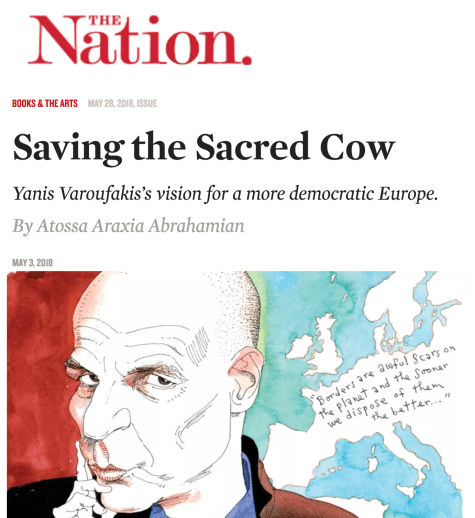
That isn’t to say the union would be problem-free: Unresolved conflicts between national sovereignty and a supranational bureaucracy were baked into its very structure. And the EU never totally figured out a unified fiscal policy, or how it would deal with large-scale bank failures. Indeed, it took until the financial crisis of 2008 for one of the most fundamental tensions of all—that sovereign nations sharing a currency could not make their own decisions about borrowing, lending, and spending—to become a cause for alarm. When banks went on a continent-wide lending spree in good times, the economy hummed along happily. In the grim post-2008 years, Europe’s political and economic union appeared to be in a state of imminent disintegration. When European leaders began pushing austerity on countries like Greece as the only way out of bankruptcy—and when their counterparts farther west felt like they were still picking up the bill—freedom of movement and a common market and currency didn’t seem like such a good trade-off.
REVIEWED
TALKING TO MY DAUGHTER ABOUT THE ECONOMY, By Yanis Varoufakis
ADULTS IN THE ROOM, By Yanis Varoufakis
AND THE WEAK SUFFER WHAT THEY MUST? By Yanis Varoufakis
Greece was not the only country to rebel against these conditions. Nationalist politicians throughout the continent began to speak of Europe not as one people, but as a hodgepodge of countries bound by pesky supranational rules. Brexit put this notion to a referendum: Why help faceless Europeans when there are Brits down the street who need help too? And why bother with the entire supranational enterprise anyway? Nor are Brexiteers the only ones asking these questions. Many on the left—from Greece’s Syriza to Mélenchon’s La France Insoumise—also had grown uncomfortable with the idea and especially the economic institutions of “Europe.”
When Yanis Varoufakis, the former Greek finance minister who hopes to become the country’s next prime minister in 2019, first came to international prominence in the aftermath of the financial crisis, he was one of those left-wing politicians critical of Europe’s economic institutions, though not necessarily of the idea of Europe itself. Even as a young man, Varoufakis had always been struck by the idea of a united Europe as a way to “forge bonds relying not on kin, language, ethnicity, [or] a common enemy, but on common values and humanist principles.” His brief stint in the Syriza government never shook that conviction, but it did shape his ideas about how Europe should be reformed, and his trilogy of books about the financial crisis—The Global Minotaur; And the Weak Suffer What They Must?; and Adults in the Room—along with his latest book to be released in English, Talking to My Daughter About the Economy, all advance his vision of a more democratic international system.
The problem with Europe is that it is not a political union but a monetary one. Worse, key decisions about spending and lending are shaped by German and French technocrats, not by elected national representatives acting on their constituents’ wishes. Varoufakis’s reform proposals, put forward via his new pan-European movement, DiEM25 (“Day 25” in Latin), are wide-ranging and admirable. He hopes to see something like a United States of Europe emerge out of the EU’s existing structure—one in which Europeans share rights and responsibilities in both good times and bad, aided by the continent’s central banks, which would pool the profits from their various investments in a common depository in order to secure the economy in moments of crisis or scarcity. A share of every initial public offering undertaken in the EU would likewise go toward a universal dividend for all Europeans; citizens would be guaranteed a decent job in their home country, to prevent involuntary migration. By the same token, a common inheritance tax would apply, regardless of where people lived (or died).
Rather than getting bailed out in their home country, banks would be “Europeanized” and put under public control. The European Central Bank would be more helpful to member states seeking debt relief and financing. Finally, the euro would remain in place—but through a system of digital tax credits, or “fiscal money” that could only be used at home, individual countries would have a certain amount of leeway to make their own decisions concerning alleviating poverty and funding public projects. All the while, freedom of movement throughout the EU would still apply.
There’s a lot going on here—some of it eminently practical, some not—and one could debate the specifics of Varoufakis’s policies. But the overarching motivation is simple: more democracy, more Europe, and more of the right kind of globalization to give substance to the idea of a European unity. Varoufakis summed up the spirit of his worldview in a 2015 standoff with then–German finance minister Wolfgang Schäuble: “The obvious solution [is] the globalization of welfare benefits and living wages, rather than the globalization of insecure working poverty.”
Varoufakis’s political career had begun in earnest the year before, when Alexis Tsipras, Syriza’s candidate in the approaching national elections, asked Varoufakis to be his finance minister should the scrappy leftist party win. Varoufakis had in the mid-2000s briefly advised George Papandreou’s social-democratic administration (which he came to publicly despise), but Tsipras’s offer was Varoufakis’s first opportunity to formally enter into Greek politics. Until then, he had mostly been known for his academic work. A trained economist with advanced degrees in game theory, Varoufakis had been elected to serve as leader of the black student union as an undergrad at England’s University of Essex, arguing that “black” was a “state of mind” and that, as a Greek, in the context of a dominant Northern Europe, he more than fit the bill. Finishing his doctorate in Essex in 1987, Varoufakis hopped from one academic appointment to the next over the following 20 years, teaching in the UK, Australia, and the US before returning to Greece to run the University of Athens’s economics PhD program.
In the years following the 2008 meltdown, Varoufakis began writing in a plain and refreshing English about the crash on his blog. When he was approached about the finance minister’s position in late 2014, he decided to first run for Parliament before being formally appointed, because he wanted the backing of the Greek people. He got it: Varoufakis won more votes than any other candidate. By then, he had already established a reputation as an outspoken Marxist iconoclast at home, and his entrée onto the international scene could not have been better timed. The cast of the European debt narrative appeared almost exclusively in muted suits, so Varoufakis’s presence—leather-jacketed and pulling up on a motorcycle—filled a significant dramatic hole.
The real work began two days after his election. As Syriza’s finance minister, he had to negotiate intractable debt-reduction deals on his country’s behalf. At this point the European Central Bank was offering Greece financing, but the terms were onerous; the rest of Europe was dead set on punishing his country for its previous fiscal transgressions, some of which were real (like the Greeks’ tendency not to pay their taxes) while others were a product of happy-go-lucky lending in deficit countries on the part of large banks, with no plan B on the continental level to manage the fallout.
Varoufakis had no love for his country’s creditors, but he saw the EU favoring the bottom lines of international banks over the welfare of the Greek people. He was also practical, and keen to “shower [the EU] with moderation” and prove it wrong about the Greeks being undisciplined and lazy. So he assembled an international team of supporters, including American economists Jeffrey Sachs and James Galbraith, former treasury secretary Larry Summers (aka “the Prince of Darkness”), and Deutsche Bank’s Thomas Mayer, along with some financiers from Lazard, the asset-management and advisory firm, to demonstrate to Brussels that he was willing to negotiate on its terms.
That was when his lack of political experience started to show. Over the five months that followed, his meetings followed a depressing pattern: A sanguine Varoufakis would enter the negotiations, with a mandate from his people to reject the austerity measures that were causing a crisis back home. He would hit it off with seemingly sympathetic European ministers who, in private, would appear to be on his side. He’d spend all night coming up with an ingenious financial workaround to placate even the most hawkish austerity-mongers, thinking sincerely that he was getting somewhere. Then he’d wake up to discover that he had been stabbed in the back by much of the rest of Europe.
The betrayals in Brussels came from all over: socialists, conservatives, friends, foes. Varoufakis noticed a “terrible disconnect between the eminently sensible things some ministers say behind closed doors and the inanity of their statements…when the television cameras are switched on,” he writes in And the Weak Suffer What They Must? The only person to play it straight was Schäuble, whom Varoufakis characterizes repeatedly as a humorless crank (part of it seems to be his frustration at his own inability to charm him). For many of Europe’s leaders, Varoufakis declares, austerity became a “morality play pressed into the service of legitimizing cynical wealth transfers from the have-nots to the haves during times of crisis, in which debtors are sinners who must be made to pay for their misdeeds.”
In the end, even Syriza gave Varoufakis up. Before he’d been formally appointed, he had impressed upon his party that in order to get the best debt deal possible, they had to be willing to make concessions: privatizing certain industries, transferring Greek bank shares to the EU, launching a domestic development fund, and creating a public “bad bank” to deal with toxic loans so that individuals and small businesses would not have to pay for the bankers’ indiscretions. But he also insisted that the party had to pledge not to “bluff against the troika” (meaning the European Commission, the European Central Bank, and the International Monetary Fund); if Syriza was serious about Greece staying in the EU and getting itself back in the black, then the party had to agree to refuse another bailout with austerity attached to it, even if the consequence would be to default or to stage a “Grexit” from the EU. And so they agreed—at least in theory. But when Syriza won the election, that scenario stopped being hypothetical and many within the party started to feel the pressure to get with the EU’s program.
By midsummer, it became clear that Varoufakis had lost support not just in Brussels, but in Athens. The country was running out of money, the markets were still shaky, and the threat of capital flight loomed over Greece. Syriza called a referendum on whether to accept an onerous new debt deal. The Greek people voted against it, vindicating Varoufakis’s position. But a bleary-eyed Alexis Tsipras announced that he’d opted to comply with the German agenda, leaving Varoufakis abandoned by his party. On his blog, he accepted Syriza’s request to step down, adding, “I shall wear the creditors’ loathing with pride.”
There’s no question that Varoufakis was upset by the events of 2015. The bailout that Tsipras and Syriza accepted brought with it more debt and more austerity troubles; Greece will likely be repaying its creditors for decades to come. This was a punch in the gut. While Varoufakis embodies the vision of an urbane cosmopolitan (he spent time abroad in part to avoid the draft), he still identifies very much as Greek. His commitment to public service easily defies British Prime Minister Theresa May’s now-infamous statement that “if you believe you’re a citizen of the world, you’re a citizen of nowhere”; Varoufakis wanted to see Greece escape from the fate that the troika was imposing upon it and set an example for anti-austerity parties across the continent. To add insult to injury, he got blamed by his party for screwing up in Brussels. Some have even attached a price tag to this failure, arguing that he’d personally cost Greece billions of euros.
Varoufakis’s resignation nevertheless helped him out in one way: He’d held public office but never actually had to sell out. Since Varoufakis has always presented himself as a bit punk, that didn’t exactly hurt his image. While politicians and elites snubbed him, he explains in Adults in the Room,
Taxi drivers, suited gentlemen, old women, schoolchildren, policemen, conservative family men, nationalists and far-Left recalcitrants alike—a whole society whose sense of pride and dignity had been offended…would stop me in the street to offer thanks for that brief moment…. It is a source of personal pride and joy to me that the troika’s cheerleaders within Greece use every opportunity they can to undermine me. I consider their attacks a badge of honor, conferred for having dared to say no to their demands in the Eurogroup.
Since stepping down, Varoufakis has used his considerable talents as a writer, an economist, and, yes, a brand to demystify complex financial concepts designed to elude us. He’s appeared on TV shows, in gossip rags, even on Russell Brand’s podcast to further this mission. “I have always believed that if you are not able to explain the economy in a language young people can understand, then, quite simply, you are clueless yourself,” he writes in Talking to My Daughter About the Economy, his back-of-the-envelope history of modern capitalism. “…Ensuring that everyone is allowed to talk authoritatively about the economy is a prerequisite for a good society and a precondition for an authentic democracy.” If this is his goal, then Varoufakis has more than achieved it. Throughout this book and his three earlier ones, he clearly and patiently helps readers come to an understanding of just how much power global corporate finance—and the supranational institutions that serve it—wields over our lives.
This isn’t to say that his books are beach reads, exactly. (I would know—I read Adults in the Room on a beach.) The subjects he covers range from Eurobonds to Bretton Woods and back to the European Central Bank; they are intricate and often dull, even when he livens them up with backroom gossip and references to Greek drama (his interlocutors, he notes, are characters straight out of Sophocles or Shakespeare: “neither good nor bad…overtaken by the unintended consequences of their conception of what they ought to do”). Still, Varoufakis patiently diagnoses problems in the system, then suggests a great many solutions. He lays out his proposed solution to his country’s debt crisis—essentially an innovative debt swap that pegs how much Greece should repay and at what rate to its GDP and rate of growth—so clearly and convincingly that it’s hard to argue with (unless, of course, you’re a Eurocrat who had actually been arguing with him). Why shouldn’t repayment be linked to recovery? It’s a perfectly logical solution.
When it looked like Greece might be cut off from receiving funds if it didn’t agree to the Eurogroup’s demands, Varoufakis devised a parallel economic system of “fiscal money” that would allow Greeks to pay for goods and services using future tax credits instead of cash, thereby keeping the economy running. He later even admitted to hatching a harebrained contingency plan that involved hacking into Greece’s tax systems with the help of a childhood friend who knew about software and assigning a reserve account to every tax file. Fiscal policy has never sounded this straightforward—but as Varoufakis came to realize, good economics do not good politics make.
One lesson Varoufakis learned during his time in Brussels was that nearly all of Europe’s economic questions boiled down to political ones, and vice versa. What is failing to keep Europe—the idea and the continent—together is that the EU did not evolve into a single political institution, but instead became more like a group of sparring sovereigns. Going back to the EU’s origins, Varoufakis argues that its inflexibility is hardwired: From its inception as a steel-and-coal cartel to its present “megabureaucracy” status, the EU was “invented to serve a cartel of large businesses seeking common rules and industry standards in perfect freedom from any parliament with real power over its actions.” The single market, the sub-sub-agencies, the jobs advising the advisers’ advisers—these, too, were all created with the elites in mind. Most insidiously, he writes, the EU’s institutions “were designed, back in the 1950s and 1960s, in order to bleach politics out of them. And since nothing is as political nor as toxic as an attempt to depoliticize a political process, the result was institutions at odds with the concept and practices of a democracy.” Along with his commitment to internationalism, the idea that all decisions around money are political emerges as a first principle in Varoufakis’s thought. Today, his project seeks to combine these two principles into a coherent leftist platform.
You can take the money out of politics, but you can’t take the politics out of money, Varoufakis explains in Talking to My Daughter About the Economy. This is the case within each country, but as important, it is also the case between them. “There is nothing wrong with the idea of a Single Market from the Atlantic to the Ukraine and from the Shetlands to Crete,” he writes. “Borders are awful scars on the planet and the sooner we dispose of them the better, as the recent Syrian refugee crisis confirms. And there is nothing wrong with a single currency either.” What is wrong is the system of institutions that currently regulate and manage Europe’s single market and single currency; they cannot exist without a functional democracy to stabilize the powers that be. “While the unimpeded movement of goods, money and moneyed executives,” Varoufakis insists, “has always been a sacred cow of globalized finance…the equivalent freedom of movement for people has always been severely circumscribed. No wonder, then, that racism grows in proportion to our free trade zones’ economic crises.”
But there’s another, underappreciated challenge to fixing Europe that Varoufakis seems to grasp intuitively: The institutions that govern Europe are not just flawed, but boring. Varoufakis’s gripes could just as easily be rephrased to say: Europe is an institution governed by bores, who make boring rules about boring things and make even the most outrageous proposals—austerity, for starters—sound boring. If Europeans are ever going to engage or care enough to change things, this can’t go on. Politics and economics need to become interesting again. The stakes are just too high. Toward the end of And the Weak Suffer What They Must?, Varoufakis poses what has emerged as the central question of his political project today: “Can we combine deep criticism of the European Union with an appreciation of the tremendous costs that its fragmentation would occasion?”
That’s the question Varoufakis’s new European political movement, DiEM25, is supposed to answer. It’s also the motivation behind his 2019 candidacy in Greece with a new party called MeRA25, the party of “responsible disobedience.” DiEM25 is premised on the idea of a different kind of Europe—a more democratic one focused on sharing in the good times and the bad, and united “against the dominant oligarchy-without-borders but also against nationalist parochialism.” Varoufakis and his followers initially thought they might be able to achieve these goals by supplementing national parties with a “transnational list” to compete for seats in the European Parliament. These slots, they hoped, would replace the ones abandoned by the UK after Brexit; they would thus discourage nationalism at the procedural level, by making room for political parties to appeal to all EU citizens, not just those in their home country. The EP voted against transnational lists in February; DiEM25, registered as an international organization under EU law, still has plans to organize across borders and to partner with politicians in individual countries to advance their ideas on the ballot.
To that end, DiEM25 has proposed a policy platform that local politicians might attach themselves to: a European New Deal that revolves around green energy, more debt reform, profit-sharing, and other progressive ideas. At this early stage, its mission, while ambitious and clearly articulated, rests more on big ideas than actionable policies; the movement’s jargon-heavy organizational structure, with its “coordinating collective,” “advisory panel,” “validating council,” and so on, is faintly reminiscent of an undergraduate Trotskyist group (or worse, the EU itself).
It’s hard to imagine this European New Deal taking shape unless its supporters come to power on a large scale, but there’s nevertheless something to be said for Varoufakis pushing these ideas into the open. Much as he did with his memoirs and columns, he is moving the Overton window to the left—and given the spirited conversations taking place about a universal basic income, job guarantees, and even cryptocurrencies (which Varoufakis characterizes as utter nonsense), the time seems right for it.
Varoufakis’s national party, MeRA25, is positioning itself to seize this sort of power, or at least a seat at the table. It is likewise based on economic recovery and debt relief—for starters, nationalizing the banks on day one to pay back Greece’s debt. That, of course, is a matter of political, economic, and personal importance for its leader: “I wake up, and dream at night, of debt [relief],” Varoufakis told The Guardian. “It’s like being a prisoner of war. You have to try to escape. Our country is a debtors’ prison.” MeRA25 is not shy about framing the challenges facing Europe in class terms. “A vicious class war lurks behind the infamous ‘reforms’ that the ‘radical left’ Syriza government is implementing,” Varoufakis writes on his website, reminding voters and readers that the persistent ill effects of austerity on pensions, employment, and public assets are all designed to benefit Greece’s creditors, not its people.
If elected, MeRA25 wants to leverage Greece’s position to force change, by hook or by crook. And Varoufakis is the obvious—or rather, the only—man for this job. Without being bound by someone else’s agenda (or sense of decorum), he can nuclearize his training as a game theorist and his experience working with the European establishment to go back and make good on the types of threats Syriza never carried through. This would involve enacting its democratically chosen domestic agenda, even against the wishes of the Eurogroup; halting repayment to the IMF, the European Central Bank, and the other bodies set up to bail out ailing states; turning to Varoufakis’s alternate banking proposal should the country run out of money; and all the while, accepting the possibility of expulsion from the EU. MeRA25 reminds us that after 10 years of crisis and decades of bad leadership, Greece has nothing left to lose. In that, Varoufakis has found a certain freedom.
Since both DiEM25 and MeRA25 are not only the parties of new European democracy but also the parties of Yanis Varoufakis, they are not lacking in radical chic. Naomi Klein, Saskia Sassen, and Richard Sennett are all part of DiEM25’s advisory board. Brian Eno, another supporter, composed an anthem titled “Stochastic Processional” for the European movement. In math, “stochastic” means something has a random pattern of distribution. That might describe Varoufakis’s strange bedfellows: Julian Assange, whom he continues to defend loudly, on grounds that he’s being hounded not for sex crimes but for radical transparency; the linguist Noam Chomsky; the filmmaker Ken Loach; and the ex-president of Ecuador, Rafael Correa.
It doesn’t take Cambridge Analytica to figure out that this all-star lineup is unlikely to appeal to someone who isn’t already a Brian Eno fan with a copy of No Logo on his or her nightstand. Even so, Varoufakis says his aim with his new MeRA25 party in Greece is to win over the 1 million voters who don’t show up at the ballot box because they are too radical. Varoufakis has also been outspoken about wanting to forge alliances with centrist “reactionary forces”—even those seduced by right-wing ideas—in order to stabilize Europe.
Varoufakis’s search for approval from the right comes through in his writing, too. He takes an impish pleasure in quoting Margaret Thatcher’s comments on how the European monetary union was fated to be wholly undemocratic. He relishes the chance to surprise his reader politically, noting that his “friendship with true-blue Tory and Eurosceptic Lord Lamont of Lerwick, the chancellor who had ensured that Britain dropped out of the European Monetary System…was at odds with my image as a loony-left extremist.” He spares no criticism for the chickenshit leftists in Brussels—or in Greece, for that matter. He’s running for office against his former party, after all.
Varoufakis, in other words, is speaking to everyone you’d expect—all while subliminally marketing himself as the “loony-left extremist” whom even Tories can get behind. His vision is syncretic: a radicalism rooted in institutions, or perhaps a kind of Macronian Marxism. It’s a fitting approach for a political moment when figures like Steven Pinker preach the gospel of “reason, science, humanism, and progress.” And it dovetails with Varoufakis’s academic training as a game theorist, and his power-obsessed, materialist reading of history. In the prologue to Talking to My Daughter, he cites Jared Diamond’s Guns, Germs, and Steel as one of his biggest influences (the book got a lot of flak for its Eurocentric perspective). His appeal to repentant centrists—those who want to maintain their freedom of movement within Europe, are generally progressive on social issues, and would very much like for the extreme right to go away—seems, for the first time, rather viable. Still, to succeed as a leftist candidate and organization, Varoufakis and the DiEM25 movement will have to find allies in umbrella organizations such as the Party of the European Left, who attended DiEM25’s launch of its transnational list not as participants but as “observers.” He will presumably also have to deal with those on the left who are Euroskeptics themselves.
Varoufakis has his work cut out for him. Though he describes himself as an internationalist, a leftist, and an “erratic Marxist,” his politics don’t fit neatly inside a box. That makes him more interesting, intellectually speaking, than the likes of Jeremy Corbyn or Bernie Sanders. It also makes him less palatable as a politician. This is a man who led a black student union in his university days and now routinely rubs shoulders with bankers and Tories; a man whose wife is thought to be the inspiration for Pulp’s “Common People,” and whose own dispatches about spending time with actual common people come off as quite canned, but who would happily nationalize banks in a heartbeat should he be given that power. Dashing by on his motorbike, he can appear to embody the worst kind of champagne socialism. And yet he does inspire confidence: If anyone can figure out a way to put a chicken in every pot and a bottle of bubbly on every table, it’s Yanis Varoufakis.
Atossa Araxia Abrahamian is a journalist and the author of The Cosmopolites: The Coming of the Global Citizen (Columbia Global Reports, 2015). Follow her on Twitter @atossaaraxia.
For original post on THE NATION site, click here.
Yanis Varoufakis's Blog
- Yanis Varoufakis's profile
- 2452 followers


